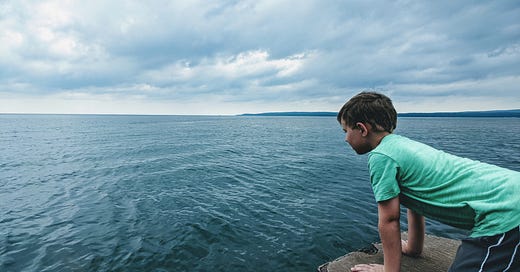I used to think life was about succeeding.
I don’t see it that way anymore.
Or, at least, success may be the wrong vessel to travel in as our primary way of living. Maybe it’s wiser to choose something else—like curiosity. The author Elizabeth Gilbert suggests, when you choose curiosity, that “Your life itself becomes the work of art—not so much contingent upon what you produced, but about a certain spirit of being that is a lot more interesting and also a lot more sustainable.”
Here’s more from Gilbert during an episode of OnBeing in 2016:
I think curiosity is our friend that teaches us how to become ourselves. And it’s a very gentle friend, and a very forgiving friend, and a very constant one. Passion is not so constant, not so gentle, not so forgiving, and sometimes, not so available. And so, when we live in a world that has come to fetishize passion above all, there’s a great deal of pressure around that.
And I think if you don’t happen to have a passion that’s very clear, or if you have lost your passion, or if you’re in a change of life where your passions are shifting, or you’re not certain, and somebody says, “Well, it’s easy to solve your life. Just follow your passion,” [laughs] I do think that they have harmed you, because it just makes people feel more excluded and more exiled and, sometimes, like a failure.
The trouble with “success” as the way of traveling through life is that, in my experience, it ends up devolving into a problem-oriented way of living. We seek out problems and try to solve them, if only for the sense of relief or to get back to a feeling of winning. Which isn’t bad.
But it’s not our ability to solve problems that make us human, though we can be pretty brilliant at coming up with solutions and solving problems. It’s our ability to dream, innovate, and believe in things we cannot see or even comprehend when we think about the future that makes us most human.
And the beginning of dreaming, innovating, and believing is curiosity.
A few prompts to carry with you this week:
When was the last time I followed my curiosity?
What can I be really curious about this week?
When I’m chasing down problems, how is that shaping me?
What problem(s) will I set aside because it is not/they are not worth solving right now?
How will I know when I’m leaning into my curiosity?
Who will I share my curiosity with?
It’s our ability to dream, innovate, and believe in things we cannot see or even comprehend when we think about the future that makes us most human.
To Check Out
Currently Reading:
Slaugherhouse-Five by Kurt Vonnegut
Empathy Trends in American Youth Between 1979 and 2018: An Update
Want some good news about Gen Z? They’re increasingly empathetic! Two measurable skills of empathetic people, perspective taking (PT) and empathic concern (EC), have both increased since 2009.
Patton Oswalt / Blocks with Neil Brennan (podcast)
You likely know his voice (Remy from Ratatouille, the narrator on “The Goldbergs”, and videos games like Minecraft: Story Mode) or even his face from “King of Queens,” “Parks and Recreation,” etc). This is an honest, raw, funny, and overall entertaining conversation with fellow comedian, Neil Brennan.
Julia Gets Wise with Anne Lamott / Wiser Than Me with Julia Louis-Dreyfus (podcast)
Longtime Anne Lamott fan, I will always jump at the chance to hear her talk. And to have a chat w/ Julia? Yes, please.
EQ Book Recommendations / Me, on LinkedIn (article)
My most popular post on LinkedIn this month has been a post sharing my top book recommendations if you want to do a deep dive on emotional intelligence. Skills like optimism, empathy, emotional expression, and stress tolerance are all things you can improve!
The Growth Equation Academy / The Growth Equation (website)
If you’ve been around this newsletter for a while, you know I’m a big fan of the books, podcast, and overall work of these guys. Now they’ve launched their own learning experience! “A brand new 50+ class masterclass on physical health, mental health, motivation, mastery, and resilience….Monthly deep dives on important topics—such as attentional health, deep work, rest and recovery, communication, leadership, and coaching.”
This dispatch was written to music, including the Beatles song, Dig a Pony. While the Beatles were obviously widely successful by many measures, you have to give it to them for putting a song called “Dig a Pony” on their final album.






